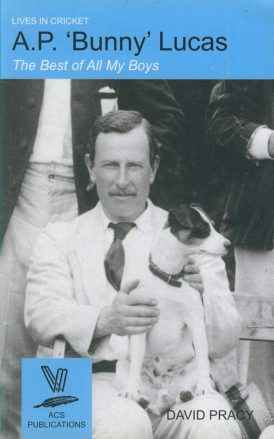AP ‘Bunny’ Lucas – The Best of All My Boys
Martin Chandler |Published: 2010
Pages: 139
Author: Pracy, David
Publisher: ACS
Rating: 3 stars

This book was the thirteenth to appear in the ACS Lives in Cricket series, a run of cricketing biographies that has now reached 58 in number, and which shows no sign of running out of steam.
So far this life of Bunny Lucas is the only contribution to the series by David Pracy. A retired librarian Pracy has, to my knowledge, made one other foray into cricket writing, Gentlemen and Players of Essex, which has very recently been posted to the ACS website. I haven’t got very far with that one yet, but what I have read of it impressed me sufficiently to want to learn more about Lucas, and to take this one down from the shelf.
The name of Bunny Lucas is seldom mentioned today. He did play in five Tests, the last of them in 1884 when he was 27. After that though he did not appear in a First Class match again until 1887, and then missed the 1891, 1892 and 1893 seasons. He did return after that though, and played on, with some regularity at times, for the next fourteen summers.
The sub-title of the book comes from a comment by Heathfield Stephenson, a former Surrey player who, as coach at Uppingham School, produced a number of fine young cricketers in the 1870s, of whom Lucas was one. Primarily a batsman, interestingly described as defensive but stylish, the younger Lucas also took a few wickets with slow round arm bowling.
Unsurprisingly Lucas was not the player in 1887 and subsequently that he had been up until 1884, and his five Tests produced just a single half century, 55 against Australia in 1880. Batsmen didn’t score as heavily in those days of course, but Lucas’ overall career figures suggest he was a good player rather than a great one.
Outside cricket Lucas’s life is not without interest. An amateur whose father was a successful solicitor Lucas chose the stock market rather than the law, and his career was not wholly successful. He was however a thoroughly decent man, unlike his brother Percy, who took over the family law firm but eventually absconded after defrauding clients. Lucas did not have children himself, but with his wife seems to have played a significant role in helping the wife and children that Percy left behind.
The biggest problem with books like this is that they must inevitably rely heavily on contemporary writings and reports and recollections of those who are themselves long deceased. Occasionally biographers find caches of previously unknown and unread documents, correspondence and scrapbooks, but in the case of Lucas nothing of that nature appeared for his biographer.
On the plus side Lucas, particularly in the context of his time, enjoyed a life that was far from dull and Pracy has managed to unearth a great deal of material about him. It is a shame there are occasional gaps, and in particular I would like to have learned more of the misdeeds of the errant Percy, but Pracy explains where his researches came to an end, so whilst there may be some disappointment there is no frustration.
Pracy has also avoided the trap of spending too much of his time describing ancient cricket matches, and he structures his book very well. He maintained my interest throughout his narrative, something not all authors in the series have managed to do.






Leave a comment